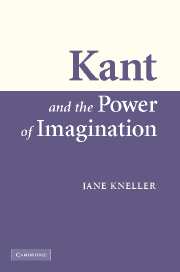Book contents
- Frontmatter
- Contents
- Preface and acknowledgments
- Introduction
- 1 Kant and Romanticism
- 2 The power of imaginative freedom
- 3 The interests of disinterest
- 4 Aesthetic reflection and the primacy of the practical
- 5 The failure of Kant's imagination
- 6 Imaginative reflections of the self in Novalis and Hölderlin
- 7 Novalis' Kantianism and Kant's Romanticism
- Bibliography
- Index
4 - Aesthetic reflection and the primacy of the practical
Published online by Cambridge University Press: 22 September 2009
- Frontmatter
- Contents
- Preface and acknowledgments
- Introduction
- 1 Kant and Romanticism
- 2 The power of imaginative freedom
- 3 The interests of disinterest
- 4 Aesthetic reflection and the primacy of the practical
- 5 The failure of Kant's imagination
- 6 Imaginative reflections of the self in Novalis and Hölderlin
- 7 Novalis' Kantianism and Kant's Romanticism
- Bibliography
- Index
Summary
Chapter 3 argued that aesthetic reflection produces interests, and that those interests might well issue in obligations on how we value ourselves and our world. This sort of claim poses a certain challenge to interpretations of Kant that reduce his account of value to moral or purely practical value. Since in recent years this view has had some very persuasive and powerful advocates, this chapter engages the topic of the role aesthetic reflective imagination might play in understanding the “primacy of the practical” in Kant's philosophy. The notion of the primacy of practical reason, which Kant introduces explicitly in the second Critique, has been adopted by a number of Kantians as the correct lens for viewing Kant's philosophy as a whole. This development has in many respects been a much-needed pendant to what might be called “second-wave” Kantianism in the US, when mid-twentieth-century analytic philosophers began a serious re-evaluation of the first Critique for developments in the history of modern theories of knowledge and metaphysics. The turn towards interpretive strategies that prioritize the practical philosophy, due in large part to Rawls, has allowed scholars to put the theory of knowledge in context, and has provided the motivation and basis for further important developments in contemporary theories of moral constructivism and Kantian-type ethics.
While acknowledging the enormous contribution to ethical and political theory that these interpreters have made, the tendency to read Kant as primarily an ethical theorist who subsumed all theory to practice is misleading.
- Type
- Chapter
- Information
- Kant and the Power of Imagination , pp. 72 - 94Publisher: Cambridge University PressPrint publication year: 2007



